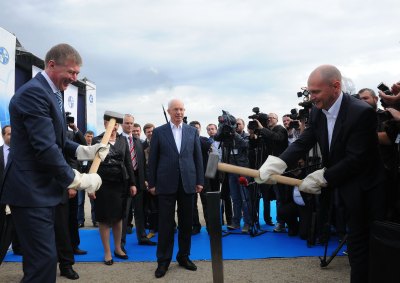As ceremonies are held in Ukraine to mark the start of work on a new Russian-built nuclear fuel plant, the countries' fuel cycle collaboration could be set to increase still further with hints of a possible conversion and enrichment joint venture.
 |
| A stake is driven into the ground to symbolise the start of construction (Image: Government of Ukraine) |
Ukrainian prime minister Mykola Azarov and Rosatom chief Sergei Kiryenko attended celebrations including the driving in of a stake to symbolise the start of construction and ceremonial laying of a stone at the fuel cycle plant site near the village of Smoline. The plant will produce fuel for Gidropress-designed VVER-1000 reactors. All but two of Ukraine's 17 operating nuclear reactors are VVER-1000s, currently using fuel supplied by Russia's TVEL. Azarov noted that the new plant would enable Ukraine to increase its energy independence, as well as to take part in nuclear projects overseas.
The plant will be built in two stages, with the first stage, capable of producing up to 800 fuel assemblies per year, completed in 2015. Construction is planned to begin on a second stage in 2016, for completion in 2020. The estimated total cost of the project is UAH3.7 billion Ukrainian (around $460 million), including UAH1.1 billion ($137 million) for the purchase of Russian fuel fabrication technology.
TVEL won a tender to construct the plant in September 2010, to be built as a joint venture with financial support from Ukraine and Russia. Ukraine's share in the joint venture is 50% plus one share, with Russia holding 50% minus one share. A joint stock company has been established by TVEL and the Ukrainian state nuclear fuel company to build the facility. Just one day ahead of the ground breaking ceremony, the Ukrainian government approved an appropriation of 80 million Ukrainian hyrvna (approximately $10 million) for the purchase of additional shares in the plant.
During the ceremony, Kiriyenko and Ukrainian energy minister Yuriy Boiko noted that the two countries are now discussing a possible joint venture to carry out uranium conversion and enrichment. Such a facility would be located on Russian territory and the joint venture would be controlled by Russia, according to Kiriyenko.
Researched and written
by World Nuclear News






_55401.png)
_23009.jpg)






